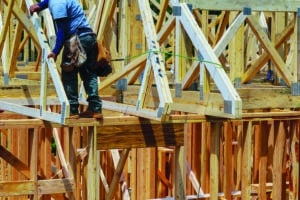A report commissioned by the Healey administration estimates the governor’s $4.1 billion housing bond bill will produce tens of thousands of new homes and generate $24.8 billion in economic activity, roughly 30,000 jobs, and $750 million in state tax revenue over five years.
The report, prepared by the Economic and Public Policy Research Group at the UMass Donahue Institute, comes at a time when the governor is attempting to marshal support for her legislation which is designed to drive down the price of housing by boosting supply.
“We know the path to economic success: it starts with housing,” Gov. Maura Healey said in a statement. “The results of the Donahue study underscore that. Hardworking Massachusetts families need access to housing they can afford.”
A leading policy analyst, however, called the report “half-baked.” Evan Horowitz, the executive director at the Center for State Policy Analysis at Tufts University, said the results contained in the report are suspect because the economic analysis does not “take into account the current state of the economy at all.”
“I was surprised and disappointed by their approach to this analysis,” said Horowitz. “It’s not well suited to understand the impact of the housing bond bill in the current economy.”
Horowitz said the Donahue Institute analysis would be more suitable if the state was in a recession because it assumes there is a shortfall of jobs and economic activity. He questioned whether it would be possible to create 30,000 jobs in what is basically a full employment economy. Indeed, he indicated the bond bill could accelerate the scramble for scarce employees right now.
“That doesn’t mean that the government can’t do great things. It can,” said Horowitz. “It just means that when you’re thinking about the impact of government activities and new spending, you have to deal with those [factors]. You have to say: we can’t create tens of thousands of new jobs because we have about as many jobs as we can have.”
Healey herself has remarked on how difficult it is to find workers right now, suggesting that the best way to address the state’s emergency shelter crisis is to help migrants living in shelters obtain work authorizations so employers desperate for employees can put them to work.
The housing bond bill is meant to jumpstart the production of homes and make housing more affordable in the state. Among other things, it would ease rules on building accessory dwelling units, or “granny flats,” set aside $800 million for the affordable housing trust fund, allow cities and towns to impose real estate transfer fees, and allocate $1.6 billion to state-funded public housing.
A spokesperson for the Executive Office of Housing and Livable Communities issued a statement saying the Donahue analysis “showed the potential for substantial expansion of the state’s construction industry to meet the demand for more housing. To meet the demand, it will be essential for state, local, corporate, and educational entities to partner on workforce development initiatives, assistance for new businesses, and other efforts to expand the state’s capacity for housing production. By aligning these efforts, Massachusetts will spur housing abundance and affordability, create opportunities for entrepreneurs to start new businesses, and strengthen pathways to economic prosperity for Massachusetts’ young people and new arrivals. ”
Horowitz was sympathetic to the legislation’s goals. “I am no opponent of this bill. I think it’s got incredible things,” he said. “I think there are parts of it that are definitely worth doing. But I am a strong believer in the importance of evidence-based policy, and this is not the kind of evidence that should inform policy.”
This article first appeared on CommonWealth Beacon and is republished here under a Creative Commons license.![]()







